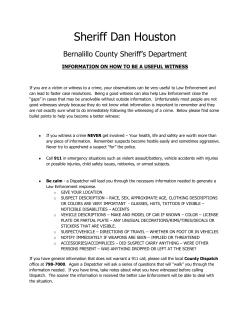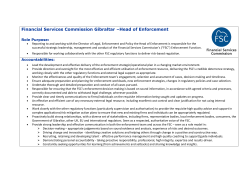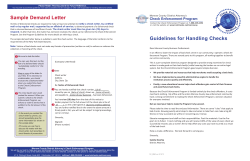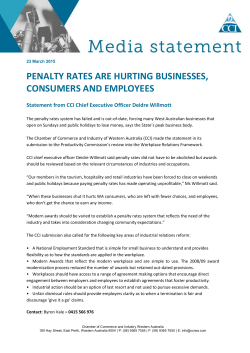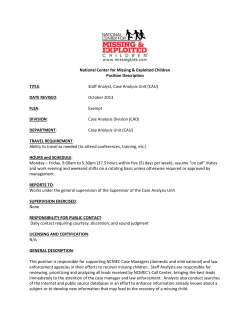
redress scheme for lettings agency and property management
London Borough of Hammersmith & Fulham CABINET MEMBERS’ DECISION MARCH 2015 REDRESS SCHEME FOR LETTINGS AGENCY AND PROPERTY MANAGEMENT OPERATORS Joint Report of the Cabinet Member for Environment, Transport & Residents Services and the Cabinet Member for Housing Open Report Classification - For Decision Key Decision: No Wards Affected: All Accountable Executive Director: Nigel Pallace, Executive Director of Transport and Technical Services Report Author: Valerie Simpson Contact Details: Bi-borough Head of Environmental Health (Licensing Tel: 020 8753 3905 and Trading Standards) E-mail: valerie.simpson@lbhf.gov.uk AUTHORISED BY: ............................................................................................ AUTHORISED BY: ...................................... ......... The Cabinet Member for Environment, Transport & Residents Services has signed this report. DATE: 16 March 2015 1. The Cabinet Member for Housing has signed this report. DATE: 20 March 2015 EXECUTIVE SUMMARY 1.1. This report seeks approval to make arrangements for the implementation and enforcement of The Redress Schemes for Lettings Agency Work and Property Management Work (Requirement to Belong to a Scheme etc.) (England) Order 2014 which makes it a legal requirement for all letting agents and property management operators in England to join one of three Government approved schemes. 1.2. This Order is made under the Enterprise and Regulatory Reform Act 2013 and is a delegated function of the Director for Environmental Health, under the Council’s Scheme of Delegation. 2. RECOMMENDATIONS 2.1. To delegate the implementation and enforcement of The Redress Schemes for Lettings Agency Work and Property Management Work (Requirement to Belong to a Scheme etc.) (England) Order 2014 to the Director for Environmental Health. 2.1. To note that the day to day enforcement of the Order will be undertaken by officers in the Trading Standards Service in accordance with the existing authorisation in the Council’s constitution. 2.2. To agree that the monetary penalty for non-compliance with the Order be set at the maximum sum of £5,000 in line with the recommendations of the final Department of Communities and Local Government (DCLG) guidance. 2.3. To authorise the Director for Environmental Health to make amendments to the amount of the monetary penalty, in accordance with the guidance where the enforcement authority is satisfied that there are extenuating circumstances taking into account any representations made by the lettings agent or property manager during the 28 day period, following the authority’s notice of intention to issue a fine. 3. REASONS FOR DECISION 3.1. The Council has a duty to enforce the Order and in that regard to determine the level of monetary penalty to impose on letting agents and property management operators, who do not comply. 4. INTRODUCTION AND BACKGROUND 4.1. The Order came into force on 1 October 2014, making it a legal requirement for all letting agents and property management operators in England to join one of three Government approved schemes. 4.2. The effect of the Order is that tenants and landlords with agents in the private rented sector and leaseholders and freeholders dealing with letting agents and property management operators in the residential sector can now complain to an independent person about the service they have received. 4.3. The scheme was bought into effect as part of the Government’s response to the Communities and Local Government Select Committee inquiry into the private rented sector published on 18 July 2013. 4.4. As part of this inquiry, evidence was gathered about tenant consumer detriment and the business practices of letting agents. 4.5. The requirement to join a redress scheme was identified as one of the recommendations to improve standards in the sector. 4.6. Definitions of what constitutes letting agency and property management work is found in the Enterprise and Regulatory Reform Act 2013. 4.7. There are three Government approved schemes as follows: a) Ombudsman Services Property (www.ombudsman-services.org/property.html) b) Property Redress Scheme (www.theprs.co.uk) c) The Property Ombudsman (www.tpos.co.uk) 4.8. Business guidance for Letting Agents and Property Management Operators was published by the DCLG on 8 October 2014. 4.9. The DCLG guidance for local authorities, attached as Appendix 1, will be used to develop/implement the scheme locally. 4.10. A maximum penalty of £5,000 may be imposed by the enforcement authority where it is satisfied, on the balance of probabilities that someone is engaged in letting or property management work and is required to be a member of a redress scheme, but has not joined. The level of penalty is to be determined by the enforcement authority. 4.11. There are strict procedures and a series of mandatory stages to follow before a penalty may be imposed. 4.12. The authority may at any time by giving notice reduce or revoke a fine. 4.13. Other London Authorities have been consulted and there appears to be common agreement within London to levy the maximum penalty of £5,000. 4.14. Attached at Appendix 2 is the impact assessment of regulation of letting and management agents by an independent body conducted at consultation stage. 5. PROPOSAL AND ISSUES 5.1. The desired outcome is to ensure that all letting agents and property management operators in the borough belong to a redress scheme which offers an independent investigation of complaints about hidden fees or poor service. 5.2. Day to day enforcement of the Order will be undertaken by officers in the Trading Standards Team, in accordance with the existing authorisation in the Constitution and local authority guidance. 5.3. The guidance issued under the order states that the expectation is that a £5,000 fine should be considered the norm and that a lower fine should only be charged if the enforcement authority is satisfied that there are extenuating circumstances. 5.4. A consideration for reducing the £5,000 fine would be where compliance is achieved, the fine is disproportionate to the turnover/scale of the business which could lead to an organisation going out of business or where there is some other negative consequence as a result, e.g. health impact. 5.5. The enforcement authority must take into account any representations the lettings agent or property manager makes during the 28 day period following the authority’s notice of intention to issue a fine. 5.6. The enforcement authority can impose further penalties if a lettings agent or property manager continues to fail to join a redress scheme despite having previously had a penalty imposed. There is no limit to the number of penalties that may be imposed on an individual lettings agent or property manager, so further penalties can be applied if they continue to be in breach of the legislation. 5.7. The penalty fines received by the enforcement authority can be used to cover the officer costs associated in enforcing this new requirement. 5.8. Where an enforcement authority intends to impose a penalty they must follow the process set out in the Order. Any enforcement action taken will be in accordance with our enforcement policy. 5.9. A project proposal has been developed. In summary, the key steps are detailed below: To identify all letting agents and property management operators in the Borough. To update the Council website with guidance and advice on the requirements under the Order and other legislation relevant to this business sector. To send a letter and questionnaire to all letting agents and property management operators in the Borough which outlines their legal obligations and collate any relevant information in relation to their business, which will be used as a local register. To consult Finance and ICT on how to administer the Notice regime. To consult the redress scheme providers, to identify businesses that do not have membership. To visit letting agents and property management operators and target those where there have been complaints and/or where they are not members of any redress scheme. To take follow up action on those who fail to meet the requirements of the Order and issue notices where necessary. To manage the recovery element of any unpaid fines. 6. OPTIONS AND ANALYSIS OF OPTIONS 6.1. This is a statutory duty for the Council. The recommendations allow for the monetary penalty to be varied in accordance with the guidance where there are extenuating circumstances. 7. CONSULTATION 7.1. Colleagues within the Council’s Private Housing team have been consulted. 8. EQUALITY IMPLICATIONS 8.1. The Council, when taking decisions in relation to any of its functions, must comply with its public sector equality duty as set out in s149 of the Equality Act 2010 (the Act). A screening for the equalities impact assessment has been carried out on the effect of the Order. The Order has low relevance in relation to its impact on the protected characteristics as all businesses will be contacted, not just a sample and this work will contribute towards the corporate priorities of the council. 9. LEGAL IMPLICATIONS 9.1. The Council has a legal duty to enforce the Order and in that regard to determine the level of monetary penalty to impose on Lettings Agents and Property Managers. 9.2. By implementing this legislation, the Council will be in a position to take action against businesses that are not members of an approved scheme which will be for the benefit of local private sector tenants and also businesses that have joined a scheme. Implications to be verified by: Tasnim Shawkat, Bi-borough Director for Law – TTS/ELRS, 020 8753 2700 10. FINANCIAL AND RESOURCES IMPLICATIONS 10.1. The cost of the additional enforcement will be met through re-prioritising existing resources with no additional cost to the Council. 10.2. It is envisaged that resources will need to be diverted initially which may impact on the delivery of other work. Any penalty fines received should offset the overall cost of enforcement activities within the service. Implications to be verified by: Mark Jones, Director for Finance and Resources – TTS/ELRS, 020 8753 6700 11. IMPLICATIONS FOR BUSINESS 11.1. The aim of the Trading Standards Service is to help local businesses to thrive and to ensure that consumer and business interests are safeguarded. This includes ensuring that there is a level playing field for businesses and that non-compliant businesses do not have an unfair advantage over compliant businesses. See the impact assessment at Appendix 2. 11.2. The implementation and enforcement of the Order will include providing advice and guidance to help businesses comply and to follow a “stepped approach”, in line with our enforcement policy, to tackle non-compliant businesses, which will include; advice, guidance, warnings, serving a notice of intent and the issuing of penalty notices. 12. RISK MANAGEMENT 12.1. The Failure to meet new and existing statutory requirements is specifically addressed in the Environmental Health Service Group’s risk register. Controls in place to mitigate this risk include training, internal auditing, periodic updates of the scheme of delegation and the business planning process. 13. PROCUREMENT AND IT STRATEGY IMPLICATIONS 13.1. None LOCAL GOVERNMENT ACT 2000 LIST OF BACKGROUND PAPERS USED IN PREPARING THIS REPORT No. Description of Background Papers 1. NONE Name/Ext file/copy of holder of Department/ Location LIST OF APPENDICES: Appendix 1 - Department of Communities and Local Government Redress Scheme guidance for Local Authorities Appendix 2 - Department of Communities and Local Government Impact Assessment of the regulation of letting and management agents by an independent body conducted at consultation stage Appendix 1 Appendix 2.pdf Redress Scheme guidance.docx
© Copyright 2025



